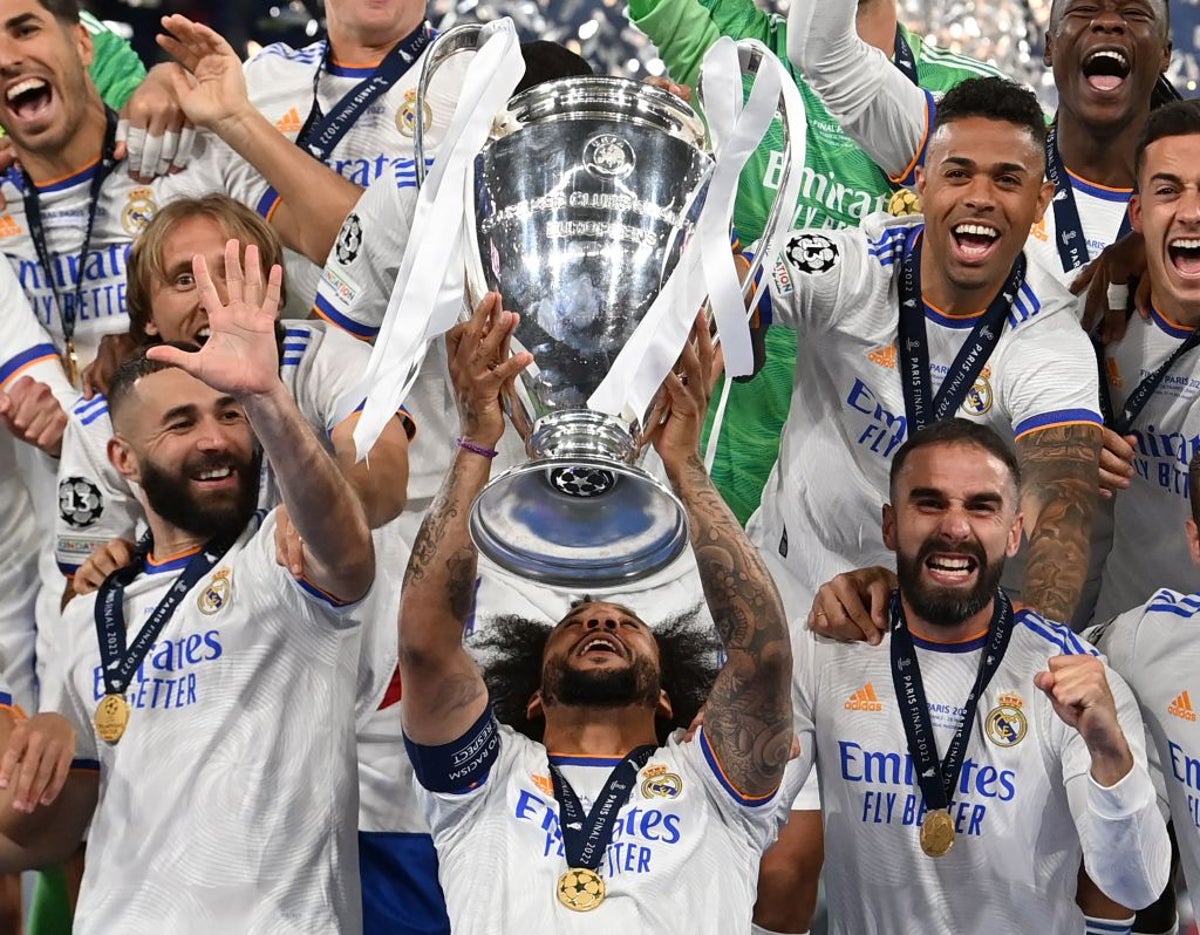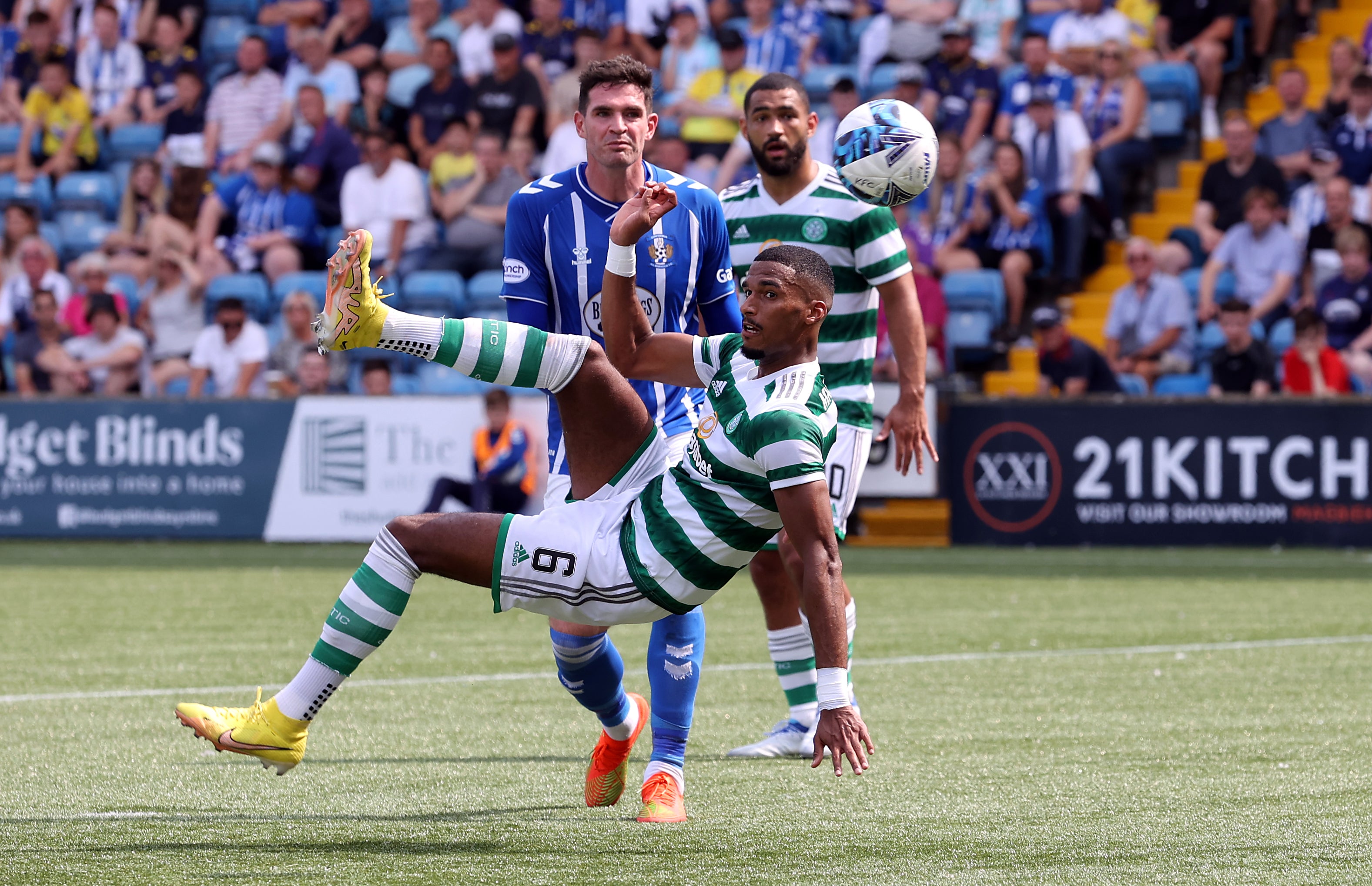
As officials of Europe’s great clubs gather in Istanbul for the Champions League draw, it will be the first time many have been together in the same room since before Covid.
There will be some tension and sizing up. The biggest issues by far will be football politics, rather than any old-fashioned trepidation about who they might face in the draw. That is because of a discussion that is now beyond old-fashioned, which is that the competition’s group stage is boring and predictable. It is such a fait accompli it is set to be finished altogether, since this is the penultimate season of the old round-robin format. Enjoy the pompous pageantry of the draw while you can.
The controversial “Swiss system” changes won’t actually solve much, though. You only have to glance across the continent to see how the group stage just follows a growing trend. Predictability is the way of European football now.
In France, Paris Saint-Germain have already scored 17 goals in three opening wins, to surely set them on the way to a ninth title in 11 years. In Germany, Bayern Munich have already scored 15 in three, to make an 11th consecutive title look like a procession. Such a feat would mean only six clubs in global football history have had longer streaks than the German champions. They are:
- Vanuatu’s Tafea FC (15)
- Gibraltar’s Lincoln Red Imps (14)
- Latvia’s Skonto Riga (14)
- Belarus’s BATE Borisov (13)
- Jordan’s Al-Faisaly (13)
- Norway’s Rosenborg (13)
So that would be two micro-nations and four small leagues, with two of them having undergone the ructions of post-communism. It doesn’t need to be said that this shouldn’t be happening in a major European league, where the very size should ensure sufficient competition. And while Ligue 1 and the Bundesliga both have their own specific problems – PSG’s Qatari ownership, Bayern’s financial power – they all add up to a much bigger problem for Uefa. Those countries’ specific issues are also connected to the fact that PSG and Bayern are now the two leading forces in the European Club Association. They have stepped into the vacuum left by the Super League, but are expected to continue in the same vein. That’s lobbying for the interests of the biggest clubs, which have historically involved arguing for a greater share of revenue and against more redistribution – although there is now pushback from a rump of smaller clubs in the organisation to change funding. That is badly needed.

The situation has meant an overwhelming proportion of club football income flowing towards seven main areas of Europe, all benefiting from what Joan Laporta, the president of Barcelona, would describe as a “virtuous cycle”. Such riches have been most maximised by the Premier League, feeding into its broadcasting contracts. It has meant it includes the most substantial parts of these seven areas, which – going by Deloitte’s figures on club revenue – are the following:
- Northwest of England (over €2bn (£1.7bn))
- London (€2bn)
- Madrid (over €1bn)
- Northern Italy (€950m)
- Munich (€650m)
- Barcelona (€650m)
- Paris (over €550m)
At roughly €8bn, it means these seven urban areas appropriate around half of the European football market’s entire €15.6bn annual revenue. They will consequently supply almost all of the Champions League’s 16 group-stage qualifiers, too, making this draw feel so pointless.
If many will see these figures and say that’s obvious because there are so many clubs in these areas, that’s kind of the point. There is obviously something broken in European football if huge population centres outside these seven cannot even hope to have clubs of such financial size.
It poses a question for the European governing body that is becoming existential, especially since it is now being asked in the pending legal case brought by the Super League.
Is Uefa really fit for purpose if it has allowed so much of football’s wealth to have accumulated in so few areas? They form a financial mass that is now weighing so heavily on the rest of the sport that it could create a fracture point.
That is what is really being discussed in Istanbul this week, as that ongoing European Court of Justice case hangs over the entire game. The officials from Real Madrid, Barcelona and Juventus are now feeling bullish, rather than ostracised.
The feeling is that the initial hearing has gone well for them and Uefa “should be worried”. For all that the governing body has made “populist” arguments about the ills of the Super League amid widespread state backing, the case is solely about whether Uefa represents a monopoly in competition formation. That, it’s argued, is what the Champions League represents. Uefa’s lawyers have countered that a so-called “monopoly” is necessary because it’s really the entire ecosystem of European football that requires safeguarding, with that feeding into arguments about how elements of the arts are protected by European law.
And that is where Uefa has left itself open.
It is very fair to wonder how exactly Uefa is safeguarding European football if it has become so financially unbalanced – if large swathes of its culture are now wastelands just serving the top leagues. Look at how pointless the Champions League is for so many great names, from PSV Eindhoven to Dinamo Tbilisi.
That is just one line of attack from the Super League’s lawyers, to go with longer-term arguments about how Uefa is both a regulator and an organiser, generating huge sums from a system it is supposed to police.
The gall of that stance is admittedly as remarkable as it is ironic. It is clubs such as Juve and the Clasico two that bullied Uefa into this position in the first place, always dangling the Super League, only now to point out the flaws in a landscape they shaped more than anyone.
This is where it is impossible not to have sympathy with the governing body. It is also, however, where there can be criticisms.
Uefa has never been proactive. Almost every piece of regulation related to all these issues has been reactive, only ever responding to what is put in front of Uefa’s face, which has only served to fortify the status quo. Hence the big clubs, including PSG and Bayern, so often getting their way in terms of prize money and revenue distribution; and . hence the landscape looking like this, with money piles in a few areas towering over the rest of Europe.
The latest example of such responses is the forthcoming transformation of the Champions League. The so-called “Swiss system” just sidesteps the true problem, rather than tackling it. It doesn’t address the financial disparity that has really made the group stage so boring, and might even make the issue worse.
It hasn’t placated anyone, either. “No one is happy with it,” says one prominent official.
That feeds into a growing dissatisfaction with Aleksander Ceferin from across the game, and that isn’t just from the Super League forces. Even those against the project feel the Uefa president has totally squandered the momentum and opportunity from that time. They believe his responses have been superficial. It has also been noted how he thanked the likes of Boris Johnson for the failure of the Super League, but didn’t pass on the same gratitude to league executives such as Javier Tebas and Richard Masters.
A widespread opinion in football’s legal circles is that Uefa displays “poor governance” and a lack of foresight. If that sounds harsh, it can at least be sensed in the argument over a potential solution to all of this. One of the reasons that clubs from major urban centres – such as Ajax, Celtic or Club Brugge – cannot generate competitive income is that the leagues they play in are too small, making the TV market too small. They are too big for their own countries but not big enough for the Champions League, leaving them in an odd football limbo.

Uefa could immediately get around this by opening the door to regionalised leagues. It would immediately transform the prospects of hundreds of clubs, while retaining the basic structure of European football and spreading revenue.
Ceferin just won’t agree to that, though, because he is too wedded to traditionalist ideas. More critical sources put it down to “a need for total control” and “protectionism”.
It is why the Super League’s next step is to try to seduce these mid-tier clubs. They would love a competition with Juventus, Real Madrid, Barcelona, Ajax, Porto, Celtic and select others. It is why anti-Super League voices now admit that “the game could maybe do with some kind of reset”.
It’s just that, depending on who is responsible, it can still get worse. It is obvious the European game needs a safeguarding body such as Uefa, rather than just being in the hands of the major clubs. Football’s unified pyramid is also one of its great advantages, unlike the free-for-alls in cricket and boxing.
December’s judgment, which will rule on whether the ECJ case goes to the next stage, could start to decide some of this.
Figures with knowledge of the proceedings ultimately expect one of three outcomes if it does go the distance. The first is that the court takes a purely political interpretation and judges that a Uefa “monopoly” is justified. The second is the complete opposite, and Uefa is broken up. The third is a more centrist position, whereby Uefa isn’t broken up, but it is argued that it can’t be both a regulator and a competition organiser. It might only be able to authorise competitions, with thicker walls between its various parts.
Some believe there could be an unforeseen “Solomon’s baby solution” that leaves no one happy. The date 15 December is going to be key, because it will decide the next step.
It says a lot that it’s much harder to predict than the entire Champions League group stage.







